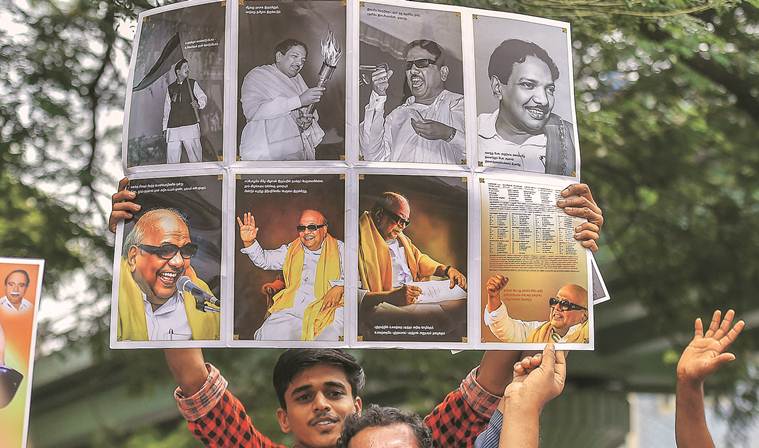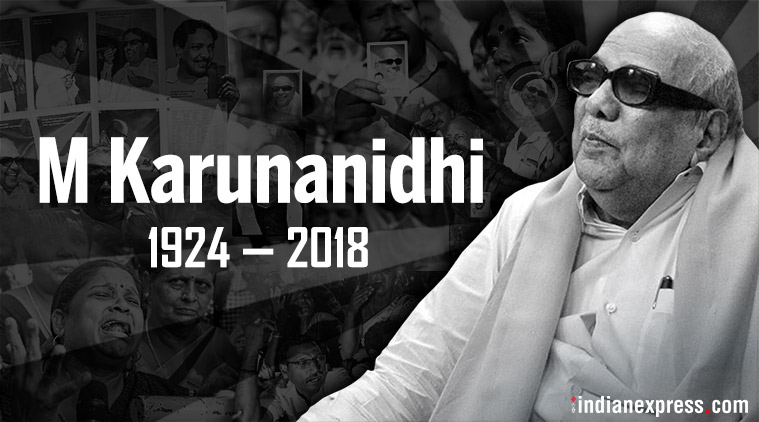 DMK supporters near the Kauvery Hospital. (PTI/File)
DMK supporters near the Kauvery Hospital. (PTI/File)
The emergence of M Karunanidhi as a top leader of the DMK, after C N Annadurai’s death in 1969, was also a time of emergence of Chennai as a metropolitan city. Within a year of Annadurai’s death, the population of Madras touched 25 lakh, with over 10 lakh people living in what the authorities called “slums”.
It was the political and social challenge of doing justice to this huge population that led to the formation of Tamil Nadu Slum Clearance Board (TNSCB), a body tasked to provide quality living conditions for the city’s daily wage labourers, domestic help and working class population. And the goodwill behind constituting such a body was vividly described in the ‘motto’ drafted by the then rationalist CM Karunanidhi — “Ezhayin Sirippil Iraivane Kanbom” (We shall see God in the smile of the poor).
Karunanidhi’s 1970s’ mission was to improve the conditions in the slums, lay roads, erect street lights and provide other essential services including parks and dispensaries.
When Annadurai was CM and Karunanidhi his right hand man, in 1967, the DMK government brought an amendment in the Hindu Marriage Act to recognise ‘self-respect marriages’. The reform helped make marriages valid even without rituals. Tamil Nadu continues to be a state where one can get married without any rituals.
The Karunanidhi regime in 1989 made an amendment to provide equal rights for women in ancestral property, to make sure that women have equal rights as men in the family. This amendment to the Hindu Succession Act of 1956 fulfilled the demands raised by the Self-Respect Movement since the 1920s.
A major challenge for Karunanidhi in his first year as CM was to bring land reforms. He introduced the Tamil Nadu Land Reforms (Reduction of Ceiling on Land) Act in 1970, which reduced the ceiling of land ownership for a family to 15 standard acres, from 30 acres in the earlier Congress regime. Karunanidhi used to remind his followers in rallies about how his 1970s’ Act “helped to declare 1,78,880 acres surplus and distributed among 1,37,236 eligible landless farmers, of whom 61,985 persons were Dalits”. His reform, however, was criticised for allegedly favouring landlords as it had exemptions for farm owners, sugarcane mills, etc.
 Tamil Nadu mours the death of Karunanidhi. (Source: PTI)
Tamil Nadu mours the death of Karunanidhi. (Source: PTI)
For social justice, a reservation policy by the AIADMK government in 1993 declaring 69% reservation for Backward Classes (BCs) was one that was raised by Karunanidhi even though the then CM J Jayalalithaa had taken it to greater heights. The state had a track record of ensuring reservation for the underprivileged for decades. There was 16 per cent reservation for SCs and STs, and 25 per cent for OBCs in 1951. It was the Karunanidhi regime in 1971 that increased OBC reservation to 31 per cent and 18 per cent for SCs and STs. His third regime conferred an exclusive 20 per cent reservation, a radical change, for MBCs by taking them away from the OBC category.
See Pics | Rare and unseen photos from his political journey
Inspired by the self-respect movement and working class struggles of the Left, Karunanidhi enforced a compulsory paid holiday on May Day for all industries in the state. Even today, all industries have to follow the rule in Tamil Nadu.
In 1974, it was Karunanidhi who successfully took up with the then Prime Minister Indira Gandhi the issue of the right of Chief Ministers to unfurl the national flag on Independence Day. He was seen unfurling the flag for the first time on August 15 that year. The earlier precedent was of the President of India and Governors unfurling national flags on Republic Day, while Independence Day was mostly an internal event in institutions.
 DMK Patriarch D Karunanidhi passed away after battling illness in Kauvery hospital. (Express photo)
DMK Patriarch D Karunanidhi passed away after battling illness in Kauvery hospital. (Express photo)
Welfare schemes and freebies dominated election manifestos in Tamil Nadu for several decades, and the DMK was no exception. But what Karunanidhi inherited in politics helped the DMK mark a difference, with more planning than free gifts, more planned expenditure than number of freebies, as he believed that “unless you plan, you cannot give something”. But over the years, the Karunanidhi regime was seen competing with the AIADMK on this front.
One of the finest models of ideal villages was also Karunanidhi’s idea. Samathuvapuram, a scheme introduced by the Karunanidhi regime in 1997 in the name of his political mentor Periyar, was to bring social harmony and fight caste discrimination. At a time the state had been witnessing caste violence and his own party was forced to play the community cards in electoral politics, his idea of Samathuvapuram villages had 100 houses each, where families from all communities lived together, shared a common community hall and even a burial ground.
 Tamil Nadu mours the death of Karunanidhi. (Source: PTI)
Tamil Nadu mours the death of Karunanidhi. (Source: PTI)
After Karunanidhi’s health deteriorated and he was shifted to hospital on July 27, there was news about the appointment of a non-Brahmin priest at the Meenakshi Amman Temple in Madurai. The appointment was an outcome of an ordinance of the 2006-11 Karunanidhi regime that allowed non-Brahmins to be trained in priesthood and hired by temples managed by the Hindu Religious and Charitable Endowments Department of the state government.